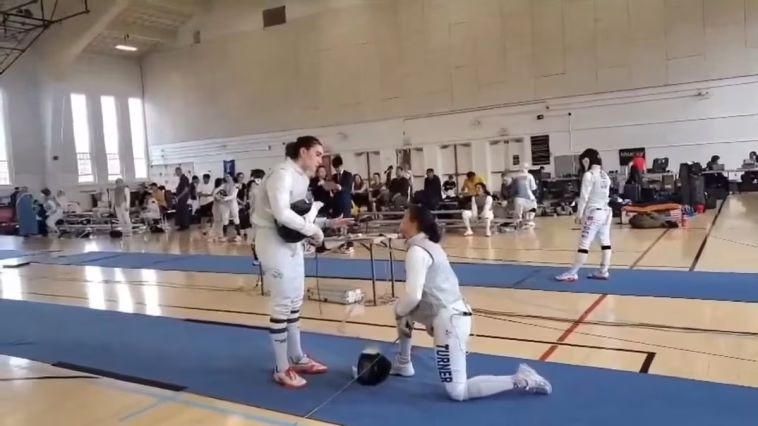A female fencer was disqualified from her competition for taking a knee and refusing to participate against a transgender opponent.
Stephanie Turner of the United States was set to compete against Redmond Sullivan in the Cherry Blossom event at the University of Maryland.
However, before the match was about to begin, Turner took a knee and removed her mask in protest of the Division 1A Women’s Foil event.
She was then issued a black card, which indicates that a player is instantly eliminated from the tournament and suspended for the duration.
Turner had played four matches before meeting Sullivan, who finished 24th out of 39 in the tournament.
Turner explained her choice to Fox News Digital: ‘I realized that I was going to be in a pool with Redmond, and from there I decided, ‘OK, let’s do it. I am going to take the knee.



I understood what I needed to do since USA Fencing had not listened to women’s concerns. At that time, I quickly dropped on my knees. Redmond [Sullivan] thought I was going to start fencing.
So as I took the knee, I looked at the referee and said, ‘I’m sorry, but I can’t do this. I am a lady competing in a women’s competition against a male. And I won’t cage this person.
‘Redmond didn’t hear me and approached me, thinking I could be harmed or that he didn’t comprehend what was going on. He inquires, ‘Are you OK?’ And I replied, “I apologize.” I love and respect you, but I will not fence you.
However, soon after, USA Fencing issued a statement in support of Sullivan and transgender athletes in the sport.
The statement said that USA Fencing implemented its current transgender and non-binary athlete policy in 2023. The strategy aimed to increase access to fencing while also creating inclusive, secure areas.
‘The policy is founded on the premise that everyone should be allowed to engage in sports, and it was developed using current research.
‘We recognize that the discourse around fairness and inclusion in relation to transgender participation in sport is changing. USA Fencing will always err on the side of inclusiveness, and we are dedicated to changing the policy if new evidence-based research arises or as policy changes occur in the larger Olympic and Paralympic movement.


‘We appreciate all points of view and urge our members to share them with us as the situation develops. It is important for the fencing community to participate in this discourse, but we want it to be done responsibly, whether at our contests or online. The path forward is via courteous, evidence-based conversation.
Stephanie Turner’s disqualification was not based on any personal comment, but rather on her choice to reject to fence a qualified opponent, which the FIE [International Fencing Federation] regulations plainly forbid.
‘USA Fencing is expected to follow the wording of the regulations and guarantee that participants adhere to international standards. We are dedicated to diversity throughout our sport while adhering to all requirements imposed by our regulatory organization.’
Sullivan, a transgender athlete, made news in December when she decided to move to her college’s women’s team.
It happened after she participated for the girls’ track and field teams at Daniel Hand High School in Madison, Connecticut.
Tennis icon Martina Navratilova and the Independent Council on Women’s Sport (ICONs) also questioned the move.
Navratilova, who is homosexual, has been outspoken about her opposition to permitting transgender women to play in female sports, claiming they have an unfair edge.
“And again….,” she said in a post on X, referring to a Reduxx piece on Sullivan.

Since his administration, Donald Trump has issued executive orders mandating the federal government to recognize just two genders and another titled ‘Keeping Men Out of Women’s Sports’.
In the latter directive, the Trump administration promised to cut money to any university that allows transgender athletes to compete in female sports. The directive urges the Department of Justice to ensure that all federal agencies execute a prohibition under Trump’s interpretation of Title IX, a provision that prohibits sex discrimination in education.
Since then, the NCAA has changed its regulation, limiting women’s sports to student-athletes designated female at birth.




